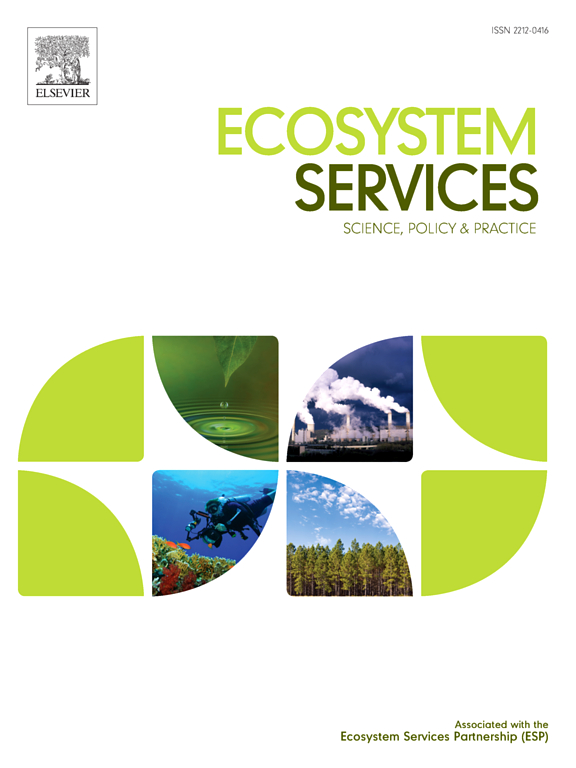东非和中欧两个地区生态系统服务观念的比较分析
IF 6.6
2区 环境科学与生态学
Q1 ECOLOGY
引用次数: 0
摘要
生态系统服务对生计、经济和良好的生活质量至关重要,对维持人类福祉至关重要。然而,对ES的看法会因经济和社会因素而有所不同。在本研究中,我们通过问卷调查(N = 243),探讨了赞比亚东部省(东非)和蒂罗尔(中欧)的当地社区和游客对ES的社会文化价值,比较了发展中国家和发达国家人们对ES的看法。结果表明,被调查者的原籍地区、受教育程度、性别、年龄和社会经济地位对社会服务感知有显著影响。供应、调节&;在东非,人们普遍认为维持社会服务比中欧更重要,而中欧的受访者则认为文化社会服务更重要。对于某些ES,性别类型、年龄组、居住地点和教育水平也会影响感知。这些社会经济上的差异被ES在个人重要性方面的排名所强调。在东非,ES“农业粮食”、“自然灾害保护”、“预防水资源短缺”和“气候调节”尤为重要。在欧洲,最常被选择的社会价值是“休闲活动的机会”和“和平的地方和宁静”。我们的研究结果为两种不同社会经济背景下自然带来的好处的社会文化重要性提供了见解,表明决策过程需要根据经济和社会背景对环境差异和不同需求做出反应。本文章由计算机程序翻译,如有差异,请以英文原文为准。

A comparative analysis of ecosystem services perceptions across two regions in Eastern Africa and Central Europe
Ecosystem services (ES) are crucial for livelihoods, the economy and good quality of life, making them essential for sustaining human well-being. However, perceptions of ES can vary according to economic and social factors. In this study, we compare people’s perceptions of ES across developing and developed countries by exploring local communities and visitors’ socio-cultural values attached to ES in the Eastern Province of Zambia (Eastern Africa) and Tyrol (Central Europe) using questionnaire surveys (N = 243). The results indicate that the respondents’ region of origin, education level, gender, age, and socio-economic status play a significant role in the perception of ES. Provisioning, regulation & maintenance ES are perceived as generally more important in Eastern Africa than in Central Europe, whereas respondents in Central Europe attribute higher importance to cultural ES. For some ES, gender type, age group, living place, and educational level also influence perception. These socio- economic differences are underlined by the ranking of ES in terms of personal importance. In Eastern Africa, the ES ‘food from agriculture’, ‘natural hazard protection’, ‘prevention of water scarcity’ and ‘climate regulation’ are particularly important. In Europe, the most frequently chosen ES are ‘opportunity for leisure activities’ and ‘peaceful places and tranquillity’. Our findings provide insights into the socio-cultural importance of benefits provided by nature across two socio-economic different contexts, suggesting that decision-making processes will need be responsive to context differences and different needs depending on economic and social background.
求助全文
通过发布文献求助,成功后即可免费获取论文全文。
去求助
来源期刊

Ecosystem Services
ECOLOGYENVIRONMENTAL SCIENCES&-ENVIRONMENTAL SCIENCES
CiteScore
14.90
自引率
7.90%
发文量
109
期刊介绍:
Ecosystem Services is an international, interdisciplinary journal that is associated with the Ecosystem Services Partnership (ESP). The journal is dedicated to exploring the science, policy, and practice related to ecosystem services, which are the various ways in which ecosystems contribute to human well-being, both directly and indirectly.
Ecosystem Services contributes to the broader goal of ensuring that the benefits of ecosystems are recognized, valued, and sustainably managed for the well-being of current and future generations. The journal serves as a platform for scholars, practitioners, policymakers, and other stakeholders to share their findings and insights, fostering collaboration and innovation in the field of ecosystem services.
 求助内容:
求助内容: 应助结果提醒方式:
应助结果提醒方式:


